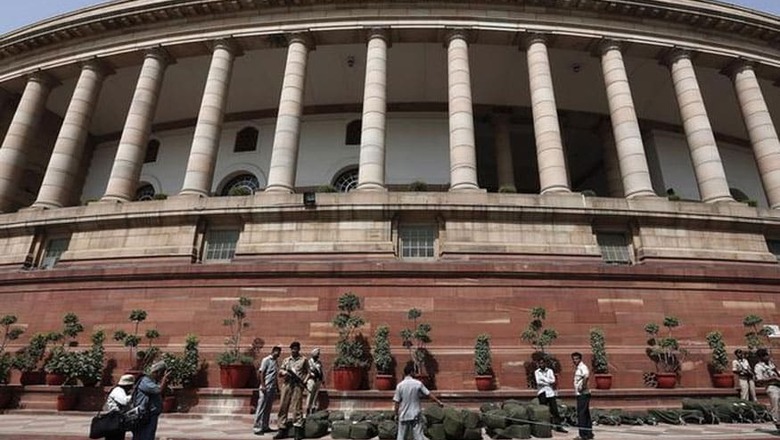
views
New Delhi: Parliament on Friday approved a bill to enable introduction of minimum wage for every worker besides addressing issues like delay in payment to employees, with Labour Minister Santosh Kumar Gangwar asserting it will benefit about 50 crore workers in the country.
The Code on Wages Bill, 2019 — which seeks to amend and consolidate the laws relating to wages, bonus and matters connected therewith — was passed in the Rajya Sabha with 85 members in favour and 8 against. It was passed in the Lok Sabha on July 30.
The Bill will subsume four labour laws — Minimum Wages Act, Payment of Wages Act, Payment of Bonus Act and Equal Remuneration Act. After its enactment, all these four Acts would be repealed.
Moving the bill for consideration and passage in the Upper House, Gangwar said, "Every labourer should have a respectful life. It is an historic bill. About 50 crore labourers will benefit."
While drafting the bill, the Minister said the government has accepted 17 out of the 24 recommendations made by the Standing Committee which had scrutinised the similar bill introduced in the previous Lok Sabha.
Replying to the discussion on the bill, he said all such workers in the country will come under the ambit of minimum wages.
He assured the House that the central government would not fix the minimum wages.
"The centre will not take the rights of the states", he said.
As per the bill, the tripartite committee comprising representatives of trade unions, employers and state government would fix a floor wage for workers throughout the country, Gangwar said, adding "minimum wage will become right of every worker."
Highlighting salient features of the bill, the Minister said the draft law will effectively address the problems relating to delay in payment of wages whether on monthly, weekly or daily basis.
The minister said the bill will ensure that there is no discriminations between male and female as well as transgenders in getting wages.
The Code universalises the provisions of minimum wages and timely payment of wages to all employees irrespective of the sector and wage ceiling, he said.
At present, the provisions of both Minimum Wages Act and Payment of Wages Act apply on workers below a particular wage ceiling working in Scheduled Employments only.
The Minister further said the floor wage will be computed based on minimum living conditions, benefiting about 50 crore workers across the country.
At present there are 12 definitions of wages in the different Labour Laws leading to litigation besides difficulty in its implementation.
The definition has been simplified in the Bill and is expected to reduce litigation and also reduce compliance cost for employers.
The Minister mentioned that The Code on Wages Bill was earlier introduced in Lok Sabha on August 10, 2017 and was referred to Parliamentary Standing Committee which submitted its Report on December 81, 2018.
However, owing to dissolution of 16th Lok Sabha, the Bill had lapsed. Therefore, a fresh Bill was drafted after considering the recommendations of the Parliamentary Standing Committee and other suggestions of the stakeholders, he added.
Participating in the debate, Madhusudan Mistry of the Congress said it is unfortunate that previous governments as well as this one after so many years are only talking about minimum wage and not fair wage.
For the fist time, through this legislation we have determined that minimum wages in the country will be reviewed after every five years, BJP's Bhupender Yadav said.
The minister, however, said the states are free to review the minimum in 2 or three years but the maximum ceiling was 5 years.
He highlighted the need for major labour reforms saying these are required as the government has introduced social security schemes for workers from various sectors.
As many as 17 out of 24 recommendations regarding the Bill given by the Standing Committee have been accepted, Yadav said.
Dola Sen from All India Trinamool Congress said the Code of Wages must be applicable for both organised as well as unorganised workers.
"In our state, our state government led by Mamata Banerjee has already published minimum wage gazette notification in state level on 29 September 2011, for 63 scheduled employments with 2,700 calorie intake per day per worker according to World Health Organisation guidelines," Sen said, adding that Central Government should follow the West Bengal model in this respect.
Vishambhar Prasad Nishad of the Samajwadi Party sought to know if there are penal provisions for contractors exploiting workers in the Bill.
He said women workers are discriminated against as they are paid lower wages as compared to their male counterparts. He also called for completely eradicating the practice of engaging child labour.
Nishad also demanded that MNREGA labourers should also be paid at par with the wages prescribed in the Code on Wages Bill, 2019.
Participating in the debate on the "Code on Wages", Manoj Kumar Jha (RJD) said hardly 40 members were present during such an important discussion which concerned 40 crore labourers in the unorganised sector and termed it as a difference between labour and capital matters.
He said that despite the economic survey mentioning that one third of the labourers do not get minimum wages, there is no representation of the labourers in the advisory board.
He also urged the government to clarify that labour timing should not exceed eight hours.
Kahkashan Perween (RJD) demanded that discrimination on the basis of sex be eliminated in minimum wages while pointing out that women labourers in Bihar and Jharkhand were getting lesser wages as compared to their male counterparts.
Also, she drew the attention of the government towards migrant labourers not getting the benefits of several government schemes as their names did not figure in BPL list.
Vijaya Sathyanath (AIADMK) demanded eradication of bonded labour system in true sense saying this system was prevalent.
Sasmit Patra (BJD) expressed concern that despite the labourers not getting minimum wages, not adequate fine has been provided for violators and said that the Motor Bill has much heftier penalties than this.
Banda Prakash (TRS) said that even an ILO report said that 41 per cent of the Indian workers were poorly paid. He said fixing of Rs 178 as minimum wages was too low.
Elamaram Kareem (CPI-M) said this code was an exercise of deception for labourers.
Dr Narendra Jadhav (Nominated) said minimum wages applied to all establishments in the organised as well as unorganised sectors.
Veer Singh (BSP) demanded justice to the labour community. Sanjay Singh (AAP) said fixing of Rs 178 daily wage for unskilled labour was too low. He demanded there be provision of jail for violators.




















Comments
0 comment